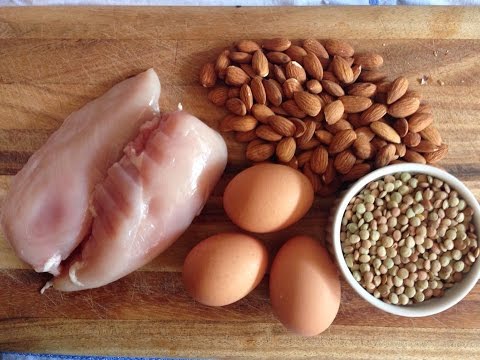The Ultimate List Of Great Bodybuilding Foods
The body relies heavily on nutrients from the foods and supplements that you consume to help create an environment conducive to huge gains.
Use this food list to make the program work for you.
Nutrition
The high levels of muscle growth and repair achieved by bodybuilders require a specialized diet. Generally speaking, bodybuilders require more calories than the average person of the same weight to provide the protein and energy requirements needed to support their training and increase muscle mass. A sub-maintenance level of food energy is combined with cardiovascular exercise to lose body fat in preparation for a contest. The ratios of calories from carbohydrates, proteins, and fats vary depending on the goals of the bodybuilder.
Carbohydrates
Carbohydrates play an important role for bodybuilders. Carbohydrates give the body energy to deal with the rigors of training and recovery. Carbohydrates also promote secretion of insulin, a hormone enabling cells to get the glucose they need. Insulin also carries amino acids into cells and promotes protein synthesis. Insulin has steroid-like effects in terms of muscle gains.[citation needed] It is impossible to promote protein synthesis without the existence of insulin, which means that without carbohydrates, it is impossible to add muscle mass. Bodybuilders seek out low-glycemic polysaccharides and other slowly digesting carbohydrates, which release energy in a more stable fashion than high-glycemic sugars and starches. This is important as high-glycemic carbohydrates cause a sharp insulin response, which places the body in a state where it is likely to store additional food energy as fat. However, bodybuilders frequently do ingest some quickly digesting sugars (often in form of pure dextrose or maltodextrin) after a workout. This may help to replenish glycogen stores within the muscle, and to stimulate muscle protein synthesis.
Protein
Protein milkshakes, made from protein powder (center) and milk (left), are a common bodybuilding supplement.
The motor proteins actin and myosin generate the forces exerted by contracting muscles. Current advice says that bodybuilders should consume 25–30% of protein per total calorie intake to further their goal of maintaining and improving their body composition. This is a widely debated topic, with many arguing that 1 gram of protein per pound of body weight per day is ideal, some suggesting that less is sufficient, while others recommending 1.5, 2, or more.It is believed that protein needs to be consumed frequently throughout the day, especially during/after a workout, and before sleep. There is also some debate concerning the best type of protein to take. Chicken, turkey, beef, pork, fish, eggs and dairy foods are high in protein, as are some nuts, seeds, beans and lentils. Casein or whey are often used to supplement the diet with additional protein. Whey protein is the type of protein contained in many popular brands of protein supplements, and is preferred by many bodybuilders because of its high Biological Value (BV) and quick absorption rates. However, whey has a bigger effect than Casein on insulin levels. Whey triggers about double the amount of insulin release. That effect is somewhat overcome by combining Casein and whey. Bodybuilders are usually thought to require protein with a higher BV than that of soy, which is additionally avoided due to its claimed estrogenic properties. Still, some nutrition experts believe that soy, flax seeds and many other plants that contain the weak estrogen-like compounds or phytoestrogens can be used beneficially, as phytoestrogens compete with estrogens for receptor sites in the male body and can block its actions. This can also include some inhibition of pituitary functions while stimulating the P450 system (the system that eliminates hormones, drugs and metabolic waste product from the body) in the liver to more actively process and excrete excess estrogen.Cortisol decreases amino acid uptake by muscle, and inhibits protein synthesis.
Some bodybuilders, such as Patrik Baboumian and Robert Cheeke follow a strict vegan diet
Meals
Bodybuilders often split their food intake for the day into 5 to 7 meals of roughly equal nutritional content and attempt to eat at regular intervals (e.g. every 2 to 3 hours). This method can serve two purposes: to limit overindulging in the cutting phase, and to physically allow for the consumption of large volumes of food during the bulking phase. Contrary to popular belief, eating more frequently does not increase basal metabolic rate when compared to the traditional 3 meals a day. While food does have a metabolic cost to digest, absorb, and store, called the thermic effect of food, it depends on the quantity and type of food, not how the food is spread across the meals of the day. Well-controlled studies using whole-body calorimetry and doubly labeled water have demonstrated that there is no metabolic advantage to eating more frequently.

Source: The Ultimate List Of Great Bodybuilding Foods




